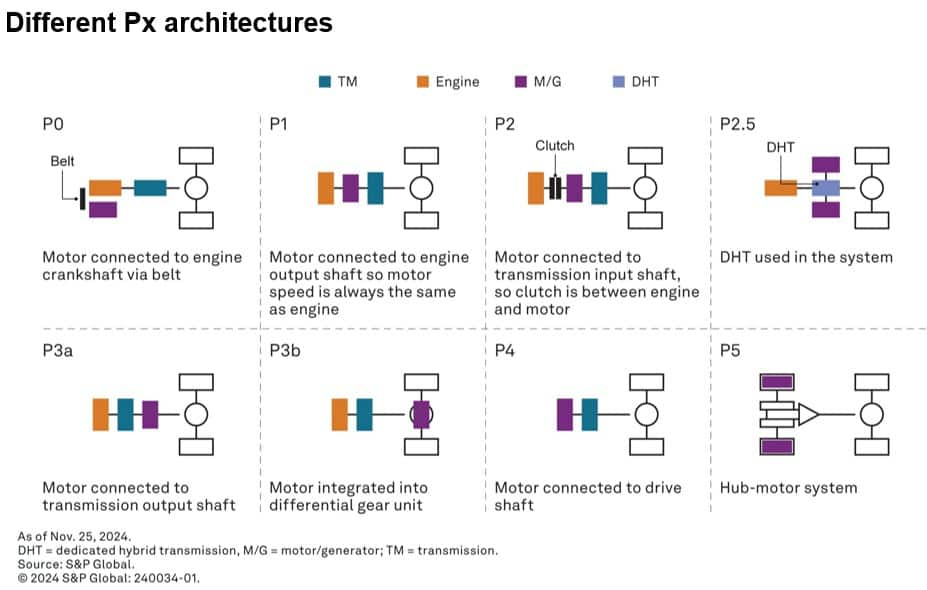|
The new car registrations data from the European
Automobile Manufacturers' Association (ACEA) indicates that hybrid
electric vehicles (HEVs) will remain prevalent longer than the
industry anticipated.
In January-October 2024, battery-electric vehicle (BEV)
registrations in the EU dropped by 4.9% year over year. Their
market share also fell from 14% last year to 13.2%. Interestingly,
HEV registrations increased 17.5% in October, with their market
share rising to 33.3% from 28.6% last October. The demand trends
are similar in the United States. Although BEV demand continues to
grow, more growth is seen in the traditional HEV segment in
2024.
The lower-than-expected growth rate in BEV demand has disrupted
the investment and product strategies of original equipment
manufacturers globally. Many are scaling back their EV investments
and reviving focus on hybrid technology.
During the 2024 CEO Investor
Day in Seoul, Hyundai announced plans to double its
hybrid lineup from 7 to 14 models. This expansion will include
hybrid technology across various vehicle categories, including
small, large and luxury cars. Additionally, Hyundai revealed it is
developing the next-generation TMED-II system, a parallel full
hybrid system, which is expected to be integrated into production
vehicles starting January 2025. Hyundai is also working on a new
range extender electric vehicle (REEV) technology.
Volvo Cars has
also revised its strategy, moving away from its initial goal of
exclusively selling BEVs by 2030. The company now plans to allow
for up to 10% of sales to be mild hybrids. Meanwhile, Ford is
reducing capital expenditure meant for pure EVs from 40% to 30% of
its annual capital expenditure budget. The challenging transition
to pure EVs is also driving General Motors and Volkswagen to beef
up their plug-in hybrid lineup in the near future.
At the recently concluded Paris Motor Show, many OEMs showcased
hybrid versions of their vehicles. The Alfa Romeo Junior Speciale
Ibrida by Stellantis featured a 136-hp 48-V Hybrid VGT architecture
and 156-hp electric motor. The hybrid system includes a 48-volt
lithium-ion battery, and a 21-kW electric motor integrated into a
6-speed dual-clutch gearbox. The automaker also showcased a 280-hp
plug-in hybrid version of the model year 2025 Alfa Romeo Tonale.
Dacia unveiled an all-new C-segment SUV Bigster in two versions: a
mild-hybrid version featuring a 0.8-KWh battery, 48V belt stator
generator (BSG) and a new Hybrid 155 version featuring a 1.4-kWH
battery and 12V BSG and transmission mounted motor. Mainland
Chinese automakers BYD and GAC also unveiled hybrid models,
alongside their EV offerings, as well as Ford.
Positive outlook for electric motor
market
The resurgence of hybrid technology bodes well for non-P4 motors
industry. According to S&P Global Mobility, demand for non-P4
motors (used in hybrid vehicles) is projected to increase at a
compound annual growth rate (CAGR) of around 11% between 2023 and
2030. Throughout the forecast period Greater China is expected to
lead the non-P4 motor market. The demand for these motors is
expected to continue increasing in North America and Europe until
2028. Japan and Korea will also see the increase in demand for
non-P4 motors until 2032. This increase in demand for non-P4 motors
can be attributed to automakers such as Toyota and Hyundai, which
are betting big on hybrid vehicles.

While the hybrid propulsion systems are expected to record
growth in the near to medium term, pure BEVs will outsell hybrids
in the long term as they are a better answer to the world's energy
transition and sustainability goals. Michael Southcott, manager,
technical research, S&P Global Mobility, says, “With consumer
sentiment around electric vehicle pricing, range and charging
capabilities remaining stagnant, and policymakers globally
reassessing ambitious targets, it's understandable that OEMs are
shifting their focus to hybrid solutions. While this doesn't change
the ultimate goal of achieving 100% zero-emission vehicles, hybrids
offer a viable short to midterm strategy for reducing vehicle
emissions, giving the industry time to plan for widespread
battery-electric vehicle adoption.”
Authored By: Priyanka Mohapatra, Senior Research
Analyst, Supply Chain & Technology, S&P Global
Mobility
By subscribing to AutoTechInsight, you can quickly
gain intel on market developments and technology trends, dive into
granular forecasts, and seamlessly drive analytics to support
challenging decision-making.
Learn more and
subscribe
|










